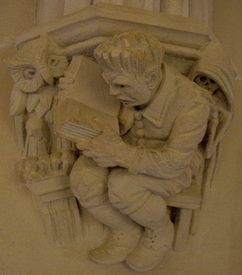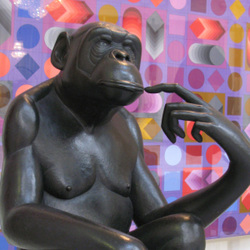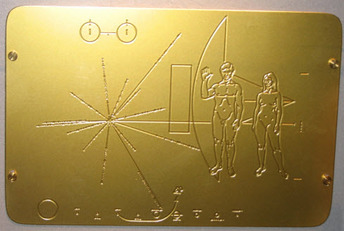
Not too often, but it does happen**.
I am wise:
- When I accept that in this life reaching destination is little and the journey is everything [1] The journey you chose is who you are.
- When I glimpse how deep is the well of the past [2]
- When I grasp that we become what we think, so that suffering follows evil thought as certainly as the wheels of a cart follow the oxen that draw it [3]
- If I can keep my head when all about me are losing theirs and blaming it on me [4]
- When I say that I know nothing and I understand: I am not of those who found the truth but of those who seek it [5]
- When I accept that of things, some are in our power, and others are not [6] but I still practice that some things are given but some we make
- When I do not forget that the source is troubled with any little stirring, but you cannot clear it with a stick; only by leaving the mud to settle [7]
- When I refrain from doing to others that which I hate to be done to me [8]
- When to serve Man, I profess that Man is the measure of all things he creates and does: of things which are, that they are, and of things which are not, that they are not [9 ]
- When I don't do anything and everything gets done [10]
- When I am mindful that to grow a plant (and many other things) you water it, but to kill it you flood it
- When people see things and ask “why” but I dream of things that never were and ask “why not?” [11]
- When, after I have done my work, people say "we did it "[10]
- When undeterred by learning all this, I still believe that what happens to me is because of me.
- When I do not need to ask anyone, any more, whether or not the gate is open to pass [12]
I did not become wise suddenly; without a long history of errors, foolishness and defeat I would have never become as wise as I am now. The more I understand how stupid I am and why, the wiser I am. In fact I am not wise, I am only about to become so, ceaselessly, with hesitation, interminably…
One thing I know: as long as I persist to seek, I am wise…
__________________________________________________________
* Have no fear; I did not see the light! This scherzo is to help you test your wisdom as it helps me question mine.
** The interesting challenge I am musing about here is: How to know when you are wise? What landmarks to use? Wisdom can hardly be measured but you can recognize its shape if you have what it takes…
[1] Constantin Cavafy, Ithaka, 1911 in Cavafy's Collected Poems, tr. Edmund Keeley and Philip Sherrard, ed George Savidis, Princeton University Press, 1980.]:
Ithaca
When you set out for Ithaka
ask that your way be long,
full of adventure, full of instruction.
The Laistrygonians and the Cyclops,
angry Poseidon - do not fear them:
such as these you will never find
as long as your thought is lofty, as long as a rare
emotion touch your spirit and your body.
The Laistrygonians and the Cyclops,
angry Poseidon - you will not meet them
unless you carry them in your soul,
unless your soul raise them up before you.
Ask that your way be long.
At many a Summer dawn to enter
with what gratitude, what joy -
ports seen for the first time;
to stop at Phoenician trading centres,
and to buy good merchandise,
mother of pearl and coral, amber and ebony,
and sensuous perfumes of every kind,
sensuous perfumes as lavishly as you can;
to visit many Egyptian cities,
to gather stores of knowledge from the learned.
Have Ithaka always in your mind.
Your arrival there is what you are destined for.
But don't in the least hurry the journey.
Better it last for years,
so that when you reach the island you are old,
rich with all you have gained on the way,
not expecting Ithaka to give you wealth.
Ithaka gave you a splendid journey.
Without her you would not have set out.
She hasn't anything else to give you.
And if you find her poor, Ithaka hasn't deceived you.
So wise you have become, of such experience,
that already you'll have understood what these Ithakas mean.
(text from http://en.wikipedia.org/wiki/Constantine_P._Cavafy)
Read beautifully on You Tube by Sean Connery
http://www.youtube.com/watch?v=1n3n2Ox4Yfk
[2] Thomas Mann, Joseph and His Brothers
[3] Buddha Dhammapada, in The Dhammapada, tr. Eknath Easwaran, Nilgiri Press, Tomales, California, 1985.
[4] Kipling, If in Rydyard Kiplings Verse, Inclusive Edition, 1885-1918, Doubleday Page and Co. Garden City, 1919
[5] Plato’s Socrates in Plato, Apology, Loeb Classical Library, Harvard UP, Cambridge.., 2005 p. 83:
“I went away, I thought to myself, "I am wiser than this man ; for neither of us really knows anything fine and good, but this man thinks he knows something when he does not, whereas I, as I do not know anything, do not think I do either. I seem, then, in just this little thing to be wiser than this man at any rate, that what I do not know I do not think I know either."
[6] Epictetus, Enchiridion in The Discourses of Epictetus, tr. G. Long, Hurst & Co, New York, p. 387
[7] Baltasar Gracian, The art of worldly Wisdom, Tr. J. Jacobs, Macmillan, London 1904, §88
[8] The Golden Rule “Never impose on others what you would not choose for yourself” Confucius, Analects XV.24 (tr. David Hinton)]
[9 ] Protagoras, in Sextus Empiricus (Adv. math. 7.60) ]
[10] Lao Tzu, Tao Te Ching, tr. Lau D.C., Penguin Classics, 1964
[11] Shaw, G.B., Back to Methuselah.., Constable, London, 1949, act I
[12] Kafka, The Trial (the gatekeeper metaphor) and Ekai, The Gateless Gate in Paul Reps, Zen Flesh Zen Bones, Penguin Harmondsworth, 1986]


 RSS Feed
RSS Feed